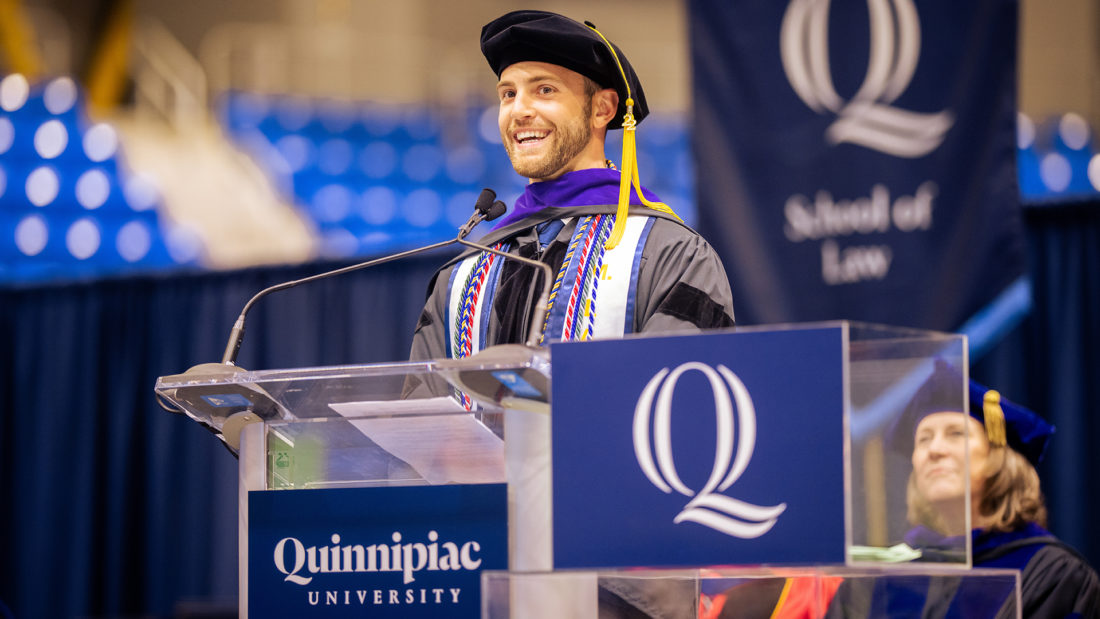Quinnipiac University conferred 128 law degrees Monday during commencement exercises for the School of Law.
Emily Bazelon, a senior research scholar and lecturer in law, Truman Capote Fellow at Yale Law School and writer for The New York Times Magazine, addressed the Class of 2022 and urged the graduates to use their education to protect others.
Bazelon framed her remarks in the context of labor law, citing decades of rulings that diluted unions under the National Labor Relations Act and the National Labor Relations Board.
“These rulings showed that for tens of millions of low-wage workers, in sectors like fast food and the gig economy, American labor law is weak,” Bazelon said. “If the NLRB can undermine vulnerable employees when they try to unionize, what does the law’s promise — to protect the rights of workers to come together – really mean?”
It means the fight must continue without rest or retreat. The obligation to defend those without the voice or the means to defend themselves.
“Use the law to advance a cause or defend a position or a group you care about. Think about who is vulnerable and needs the kind of help you can offer,” Bazelon said. “Maybe you are about to learn a lot about corporate structure, and you could help someone form a nonprofit organization.
“Maybe you are about to practice tax law, and you could help someone get back the money from their Earned Income Tax Credit without charging them an arm and a leg,” she added. “Maybe there’s an incarcerated person who needs representation to challenge an excessive sentence, or harsh prison conditions, or to bring an innocence claim. … Once you have a law license, it will help you try to solve any of these problems. It’s a form of power.”
President Judy Olian encouraged graduates to elevate and illuminate marginalized and unseen communities.
“As lawyers and legal professionals, you will be an advocate for the vulnerable, give a voice to the silent, and find yourself immersed in historic debates and what may be lifelong precedents that promote and defend critically important social rights,” Olian said.
“You’re entering the legal profession at a truly exciting time – a time when the American principles of blind justice, fairness and ethics are being tested – a time that needs ‘whole lawyers’ like you,” she said.
School of Law Dean Jennifer Gerarda Brown reaffirmed the qualities and temperament of the whole lawyer at Quinnipiac in her choice words.
“We become anxious only when we anticipate and care about what the future holds,” Brown told the graduates – twice – to emphasize its truth. “You do care about what the future holds, and now you are trained, as never before, to anticipate that future. That may trigger or exacerbate anxiety. So what can you do to mitigate that?
“Well, as many of you may remember, I told you early in your time at Quinnipiac that I wanted you while you were here to learn to think like a lawyer but continue to feel like a human being,” Brown added. “And humans are not just abstract thoughts anticipating the future and living in some disembodied state of dread. Humans are present – physically, intellectually, and emotionally.”
Shortly after receiving his law degree, Kyle Souza, the Student Bar Association president, delivered remarks that were emblematic of the entire class.
“My family is the reason I’m standing here today. I’m just so happy to have you guys,” Souza said. “I couldn’t have crossed the finish line without you, whether it was just because I was hungry or my car broke down, you were always there for me, and I really appreciate that.”
Assistant Professor Jennifer Levine, who specializes in tax law, was chosen by the Class of 2022 as professor of the year.
“My wish for you,” Levine began, “is that you will bring your love of the law, your intellectual curiosity, and your tenacity to this great profession – that you will challenge yourself and those around you through your passion and commitment to justice. That you will responsibly use the knowledge and the skills that you have learned in law school not only to uphold the rule of law, but to shape and improve the law, and to build a better and more just world.
“As you start a new chapter in your life,” she added, “remember that your learning has only just begun. Ask questions, seek answers, challenge those around you to be better. Learning is a lifelong journey – stretch to expand your horizons.”
